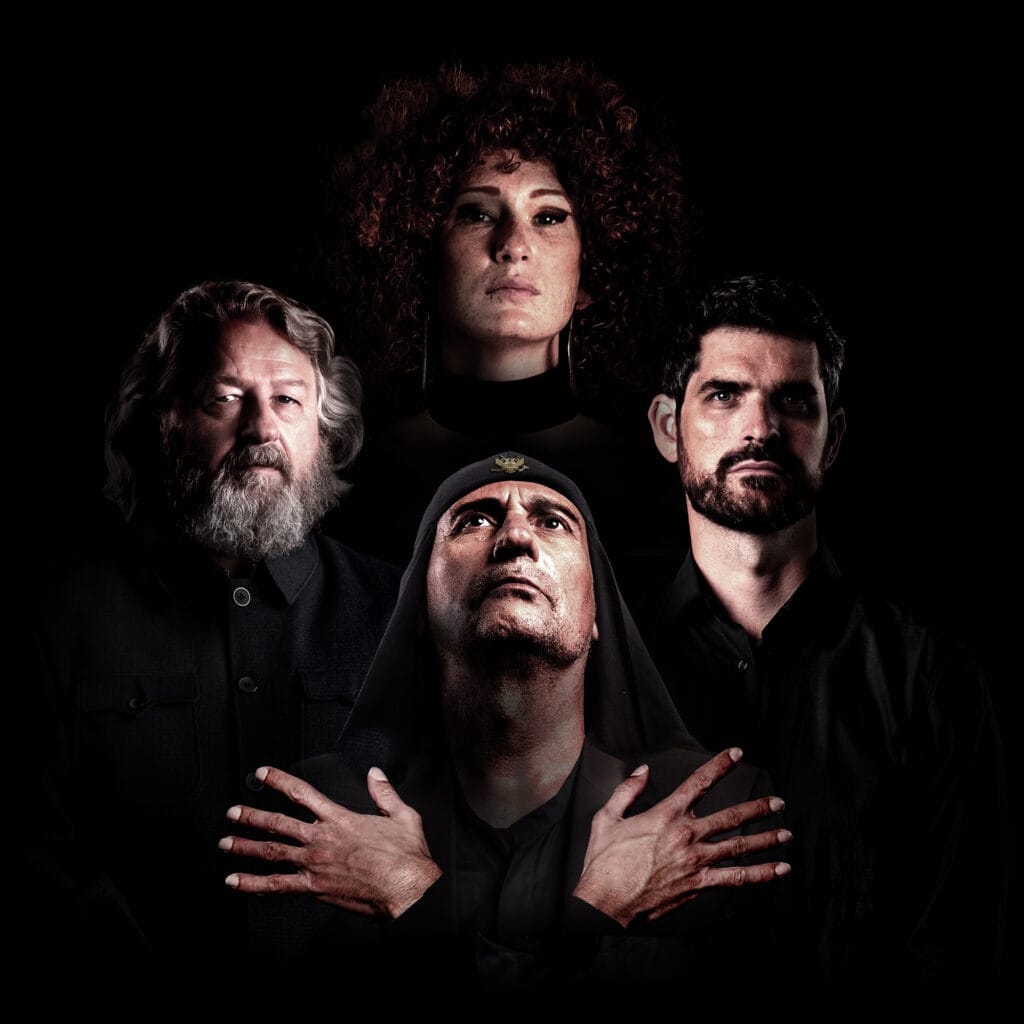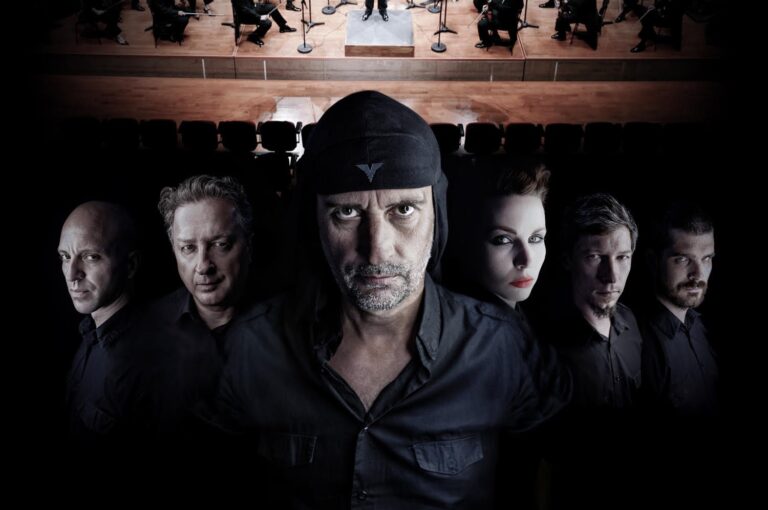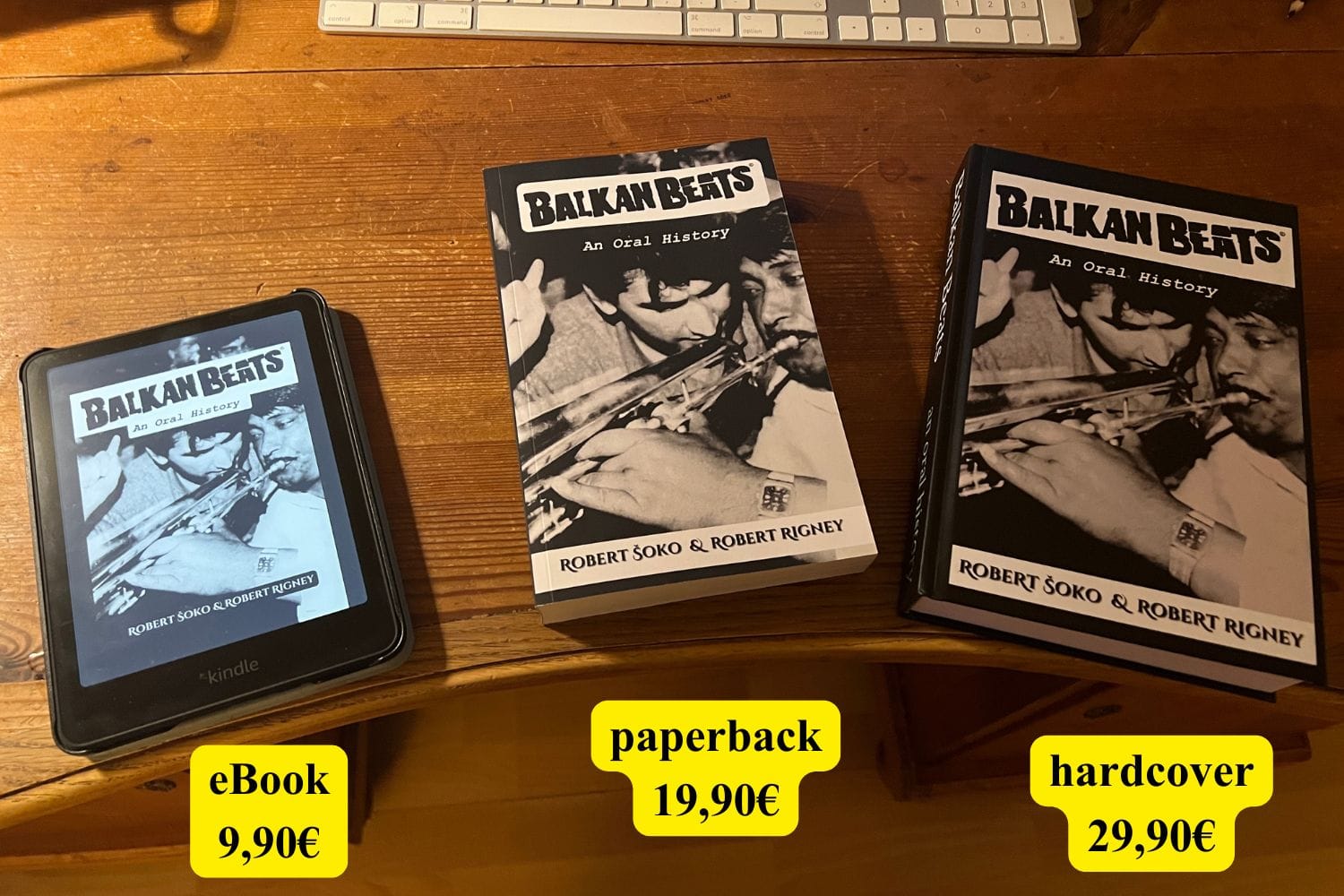
LAIBACH IN INTERVIEW
Robert Šoko:
What is Laibach telling us, what is the main message behind your (visual & audio) aesthetics?
Laibach:
Nothing is real, everything is permitted.
Robert Šoko:
How to explain your art to those who intuitively would classify you as a “nazi band”?
Laibach:
Difficult; intuition is hard to compete with. Especially because their intuition may be misleading, but Laibach is deliberately misleading too. Perhaps they should use something else beside intuition, such as reason, to evaluate and understand something like Laibach. We like to say that all art is a subject of (cultural, political…) manipulation, exept for that which speaks the language of this same manipulation.
Robert Šoko:
You rarely play with so called oriental musical styles / aesthetics. Why is that?
Laibach:
We have recently created a major oriental symphonic work, Alamut, in collaboration with composers and musicians from Iran, which we have presented in Europe in six concerts so far, and we hope that there will be more performances in the future, perhaps also in Iran. An album with this material will be released next April for Mute Artists.
Previously we also did “Also sprach Zarathustra” album, dealing with ancient oriental philosophy.
Robert Šoko:
2015 you were performing live in North Korea; what is it like? Would you do it again?
Laibach:
It was absolutely great and we would gladly do it again.
Robert Šoko:
What is your take on so called BalkanBeats scene / hype in the naughties and 2010’ years in Europe?
Laibach:
There’s nothing intrinsically wrong with the Balkan Beat scene, but it’s not really about authentic Balkan music, it’s about a stereotype (which rests mainly on the aesthetics of the Roma population in the Balkans) created for the Westerners’ view.
Goran Bregović has already made good use of this stereotype, and many other Balkan musicians have followed his footsteps as well.
Robert Šoko: Do you think it is better/smarter to vote for Trump or listen to the trumpets?
Laibach:
Trump is in a sense an authentic pop product of the American political noise, which is also created by the aesthetics of Hollywood blockbuster movies where trumpets played a big role (e.g. the epic films about the Roman Empire).
Today, a carnivalisation of politics is at work, in the spirit that we used to see in Batman versus Joker films. What ‘trump up’ really means is to make something up, especially to deceive – and in this sense Trump is very sincere in what he is doing. He is making things up and misleading the nation, and in that he is a consistent performer and a great entertainer – which is what he always wanted to be.
He is, as it were, serving a nation that has had enough of politics and just wants to be entertained. So – when you vote for Trump, you are basically listening (and contributing) to trumpeting.
Robert Rigney:
Recently it‘s been brought to light the extent to which the regime of ex-Yugoslavia actually supported and maintained rock, punk and New Wave. Laibach was one Name mentioned as an act that was officially supported. How do you respond to this?
Laibach:
If the ban on performing that we were subjected to between 1983 – 1987 means that the regime supported us, then your statement is correct.
It is true, of course, that most of the music scene in Yugoslavia was tolerated by the regime, mainly because the regime was already radically disintegrating in the 1980s, after Tito’s death, and was mostly concerned with keeping itself in power.
Therefore it really wasn’t too interested in what was happening on the music scene as such. In spite of that Laibach did receive some continuous persecution, but we successfully used it to our advantage.
Robert Rigney:
Something also about how Laibach influenced the band Rammstein. How do you see this?
Laibach:
This is a question for Rammstein, not for us. They themselves have repeatedly explained that Laibach had a fatal influence on them. In real, we are not that similar and most comparisons are misguided and superficial. If we simplify heavily we can say that Rammstein are Laibach for the masses, and Laibach are Rammstein for the gourmets.
We may not be very fond of their aesthetic paradigm, but their shows are impressive and what they do, they do extremely good. The fact that they may have borrowed some ideas from Laibach is not really important. We have also borrowed most of our ideas from elsewhere. To draw a cooking analogy – the ingredients may be the same, but the final dish is completely different.
The difference between Rammstein and Laibach could perhaps also be comparable to the difference in economic, geographical and political power between Germany and Slovenia. But Slovenians have always been able to be better Germans than Germans are, if necessary.
Copyrights © Robert Rigney & Robert Šoko | Interviewed 29. November 2024, Berlin
This interview is a part of our greater imagination aiming at completing a BalkanBeats Book.
Laibach (German pronunciation: [ˈlaɪbax] ⓘ) is a Slovenian and Yugoslav avant-garde music group associated with the industrial, martial, and neo-classical genres. Formed in 1980 in the mining town of Trbovlje, Slovenia, at the time a constituent republic within Socialist Federal Republic of Yugoslavia, Laibach represents the musical wing of the Neue Slowenische Kunst (NSK) art collective, a group which Laibach co-founded in 1984.
From the early days, the band was subject to controversies and bans due to their use of iconography with parodies and pastiches of elements from totalitarianism, nationalism and militarism, a concept they have preserved throughout their career.
Source Wikipedia

“Nothing is real, everything is permitted” – Laibach in interview
by Robert Šoko & Robert Rigney, Berlin 29. November 2024
Robert Šoko:
What is Laibach telling us, what is the main message behind your (visual & audio) aesthetics?
Laibach:
Nothing is real, everything is permitted.
Robert Šoko:
How to explain your art to those who intuitively would classify you as a “nazi band”?
Laibach:
Difficult; intuition is hard to compete with. Especially because their intuition may be misleading, but Laibach is deliberately misleading too. Perhaps they should use something else beside intuition, such as reason, to evaluate and understand something like Laibach. We like to say that all art is a subject of (cultural, political…) manipulation, exept for that which speaks the language of this same manipulation.
Robert Šoko:
You rarely play with so called oriental musical styles / aesthetics. Why is that?
Laibach:
We have recently created a major oriental symphonic work, Alamut, in collaboration with composers and musicians from Iran, which we have presented in Europe in six concerts so far, and we hope that there will be more performances in the future, perhaps also in Iran. An album with this material will be released next April for Mute Artists.
Previously we also did “Also sprach Zarathustra” album, dealing with ancient oriental philosophy.
Robert Šoko:
2015 you were performing live in North Korea; what is it like? Would you do it again?
Laibach:
It was absolutely great and we would gladly do it again.
Robert Šoko:
What is your take on so called BalkanBeats scene / hype in the noughties and 2010’ years in Europe?
Laibach:
There’s nothing intrinsically wrong with the Balkan Beat scene, but it’s not really about authentic Balkan music, it’s about a stereotype (which rests mainly on the aesthetics of the Roma population in the Balkans) created for the Westerners’ view.
Goran Bregović has already made good use of this stereotype, and many other Balkan musicians have followed his footsteps as well.
Robert Šoko: Do you think it is better/smarter to vote for Trump or listen to the trumpets?
Laibach:
Trump is in a sense an authentic pop product of the American political noise, which is also created by the aesthetics of Hollywood blockbuster movies where trumpets played a big role (e.g. the epic films about the Roman Empire).
Today, a carnivalisation of politics is at work, in the spirit that we used to see in Batman versus Joker films. What ‘trump up’ really means is to make something up, especially to deceive – and in this sense Trump is very sincere in what he is doing. He is making things up and misleading the nation, and in that he is a consistent performer and a great entertainer – which is what he always wanted to be.
He is, as it were, serving a nation that has had enough of politics and just wants to be entertained. So – when you vote for Trump, you are basically listening (and contributing) to trumpeting.
Robert Rigney:
Recently it‘s been brought to light the extent to which the regime of ex-Yugoslavia actually supported and maintained rock, punk and New Wave. Laibach was one Name mentioned as an act that was officially supported. How do you respond to this?
Laibach:
If the ban on performing that we were subjected to between 1983 – 1987 means that the regime supported us, then your statement is correct.
It is true, of course, that most of the music scene in Yugoslavia was tolerated by the regime, mainly because the regime was already radically disintegrating in the 1980s, after Tito’s death, and was mostly concerned with keeping itself in power.
Therefore it really wasn’t too interested in what was happening on the music scene as such. In spite of that Laibach did receive some continuous persecution, but we successfully used it to our advantage.
Robert Rigney:
Something also about how Laibach influenced the band Rammstein. How do you see this?
Laibach:
This is a question for Rammstein, not for us. They themselves have repeatedly explained that Laibach had a fatal influence on them. In real, we are not that similar and most comparisons are misguided and superficial. If we simplify heavily we can say that Rammstein are Laibach for the masses, and Laibach are Rammstein for the gourmets.
We may not be very fond of their aesthetic paradigm, but their shows are impressive and what they do, they do extremely good. The fact that they may have borrowed some ideas from Laibach is not really important. We have also borrowed most of our ideas from elsewhere. To draw a cooking analogy – the ingredients may be the same, but the final dish is completely different.
The difference between Rammstein and Laibach could perhaps also be comparable to the difference in economic, geographical and political power between Germany and Slovenia. But Slovenians have always been able to be better Germans than Germans are, if necessary.
Copyrights © Robert Rigney & Robert Šoko | Interviewed 29. November 2024, Berlin
+++ This interview is a part of our greater imagination aiming at completing a BalkanBeats Book +++


